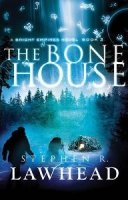
The Bone House by Stephen Lawhead (Thomas Nelson, 2011)
The second book in Stephen Lawhead's Bright Empires series took me a lot less time to read than the first, and not just because it's almost 50 pages shorter. I took both the book and the audio version out of the library, and supplemented listening on my daily walks with reading in bits and snatches at home. Despite a full schedule, I devoured the book in four days. It turns out I read a whole lot faster than a read-aloud pace. Much, much faster. However, I read for content, not beauty, not the first time through. For really good books, like The Lord of the Rings, I soak in the beauty through multiple re-readings.
The audiobook forces me to pay attention to the descriptions as well as the story, and I enjoy a much more vivid picture of the setting, characters, and events. It's almost, but not quite, enough to make me want to listen to the entire book, since I imbibed most of this book via the printed page. I think I spent more actual time listening, but covered many more pages by reading.
The Bone House is if anything more unbelievable than its predecessor, The Skin Map. The world—multiverse—of Lawhead's imagination just gets stranger and stranger. But it's also getting more beautiful (yes, I managed to pick up some of the beauty on the fly) and more interesting. There's also less of the "testosterone factor" that annoyed me in the first book: more attention to brains and character than to brawn and beauty.
The only problem with having finished The Bone House so quickly is that the next book in the series, The Spirit Well, isn't scheduled to be released until September.
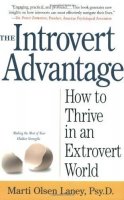
The Introvert Advantage: How to Thrive in an Extrovert World by Marti Olsen Laney (Workman, 2002)
This book was recommended by a friend, and while it did not suffer from "obligation + time pressure = irrational barrier syndrome," I did have to struggle through the first third of the book, which didn't say much that I found useful. Perhaps if it had been my introduction to the introvert/extrovert distinction, I'd have felt differently. But I found the author's approach overly psychotherapeutic—no doubt because she is, herself, a psychotherapist. I also felt that her description of an introvert didn't fit me as well as others I have read, and I had a hard time getting over her use of the terms "innie" and "outie," as if introverts and extroverts were belly buttons.
However, the rest of the book is bristling with sticky note markers. There's a section on parenting introverted/extroverted children that in itself makes borrowing the book from a library worthwhile. My primary complaint is that I'd be afraid to let any of my extroverted friends read it. Valuable as are some of its insights, I fear an extrovert would take from it the attitude, "See, I knew introverts were crazy, weak, inferior creatures." Despite the title, there's not a lot about why it's great to be/live with/work with an introvert; I was hoping for fewer tips on how to overcome my weaknesses and more on how to play to my strengths. Nonetheless, there's a lot worth reading, especially if you're willing to skim over what doesn't apply.
My best take-away? There are measurable, physical differences in the brain pathways used by introverts and extroverts. While we can, and often should, train ourselves to function in our areas of weakness, it's important to realize that something an extrovert takes for granted—as easy, requiring no thought, something "every civilized person" does—may be counter-intuitive and extremely difficult for an introvert. And vice versa.
Here's a taste—or maybe a full meal—of The Introvert Advantage. (More)
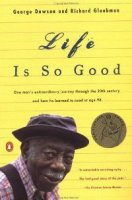
Life Is So Good by George Dawson and Richard Glaubman (Penguin, 2001)
George Dawson was born in 1898, and died in 2001. The 20th century was his in a way very few others can claim, and to read his story is to see the history of that momentous century from the inside, and to realize how much more important character and attitude are than any external circumstances.
George Dawson grew up hearing first-hand stories of slavery from his grandmother and great-grandmother. As a ten-year-old, he watched his older friend, Pete, be lynched for a crime George knew he did not commit.
"I will never work for or talk to a white person again," I said with anger.
My father, who had seemed lost in his own thoughts, jerked his head and looked at me.
"That was wrong what they did," I said. "Those white folks are mean and nasty people."
Papa swallowed hard and pulled up on the reins so that the wagon stopped.
He turned toward me. "No. You will work for white folks. You will talk to them."
"But, Papa, what about Pete? He didn't do nothing and they killed him."
"Yeah, I know they had no cause for that, but-"
I cut my father off short, something I had never done.
"But they made Pete suffer so."
"His suffering is over, son. It's all over for Pete. You don't need to worry for him."
"They took his life. Pete was still young. He should of grown to be a man."
"That's so," Papa said. "It was Pete's time, though. His time had come and that's that."
My anger still had some hold on me and I swallowed hard.
Papa looked at me and said, "Some of those white folks was mean and nasty. Some were just scared. It doesn't matter. You have no right to judge another human being. Don't you ever forget."
My father had spoken.
There was nothing to say. I didn't know it then, but his words set the direction my life would take even till this day.
Dawson's work life began when he was four, combing cotton for his family. By eight, he was working for other farmers, and doing "a man's work" by ten. He retired at 79, and finally learned to read at 98. In the meantime, his hard work, his determination to do the right thing—at which he mostly, though not entirely, succeeded—and his positive attitude took him far from his native Texas. Those were the days when a strong body and a good work ethic could get you a job and a place to sleep, and "homeless" was not a diagnosis. But he always returned home to Texas, even after a stint in Mexico where he discovered the pleasures of being considered a man, rather than a "colored boy."
There were a couple of cafes that I stopped in, not so much 'cause I was hungry but because they would serve me. I knew I was in another country when I could walk through the front door and where I sat could be my own choice. I liked that. Life was good, but I was too used to working, and after a week I caught the train back to Texas.
Like hardship and injustice themselves, it's easy for books about hardship and injustice to wallow in darkness and lead only to depression. Life Is So Good is remarkable, and well worth reading, for being able to report the darkness faithfully while infusing it with light.
Life is so good. I do believe it's getting better. — George Dawson
Note: There are a few places where the book is not appropriate for an eight-year-old, but Jonathan is not far from being able to learn much from reading it, and given that he liked God's Smuggler, it's clearly not beyond him.
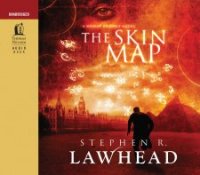
The Skin Map by Stephen Lawhead (Thomas Nelson, 2009) (audiobook, read by Simon Bubb)
I review books for the publisher, Thomas Nelson. I've never before reviewed their fiction, because, frankly, it usually doesn't sound all that interesting. However, this offer made me sit up and take notice, because I've enjoyed Stephen Lawhead's work before. Add the fact that what was offered was the audiobook version, and I was hooked: I figured it would be just the thing for my upcoming long flight across the Atlantic.
I was wrong about that part. Over and over I repeated the pattern: Listen, doze off, awaken in a different part of the story, doze off, etc. Not because the story wasn't interesting, but because I needed sleep more than I needed entertainment.
Home again, I started the story anew, and found it a wonderfully inspiring accompaniment to my daily exercise walk. The prospect of hearing a few more chapters of the book was just the incentive I needed to get out and get going. Plus, it's really hard to fall asleep while walking.
Lawhead takes the concept of ley lines as his jumping off point (literally) in this tangled adventure of multiple realities. Or perhaps one reality that is infinitely more complex than we have supposed. Ley lines were new to me—I was as ignorant as his long-dead great-grandfather found protagonist Kit Livingstone to be. In The Skin Map, the power of ley lines is discovered to be, not legend, but cold, scientific fact, and a wrong turn one day in London takes Kit from his directionless, boring existence into adventure, danger, and more directions than he fears his mental health—and his stomach—can handle.
Without doubt, it was easy to be caught up in the adventure, and the mystery. But my favorite parts of the book were its well-researched intersections with everyday life: in modern England, 17th century England, 17th century Prague, Macao during China's Qing dynasty, 18th dynasty Egypt, and more. My least favorite were the drawn-out descriptions of the physical appearance of every female character encountered, and the even more interminable battle scenes, both of which were obviously included for the more testosterone-laden among us.
Therein lies the weakness, and the strength, of the audio version. Were I reading, instead of listening, I'd have quickly skimmed over those parts I found dull; instead, I was forced to wait, impatient, through them. On the other hand, I would probably also have given short shrift to the many highly descriptive scene-setting passages, and this format forced me to listen, to enjoy, and to appreciate a much more vivid picture of each setting than I would have envisioned on my own. Narrator Simon Bubb also does a fantastic job of bringing the characters to life through their voices, making this audio version an enhancement, rather than merely a slower and more laborious—albeit hands-free—way of reading the book.
On my own personal scale, The Skin Map is not nearly as good as The Lord of the Rings (one of my favorite stories of all time), and a whole lot better than Harry Potter (which I enjoyed, though less and less, I'll admit, after the third book). It's an interesting concept, a riveting story, and well-written to boot. True, there were times when I sighed, "Oh, come on, that's not plausible"—but that tends to happen to me even with nonfiction books. Astonishingly, for this age, Lawhead manages to craft a complex and engaging tale without ever being offensive, edgy, or over-the-top. I can't say for certain that there are no "grandchild warnings"—I'm pretty sure "bloody" occurs a few times, not related to battle scenes—but any potentially offensive language is rare, minor, and appropriate to the context.
The book is not short—448 pages in printed form—but the end came long before I was ready. Really, it seemed the story had just gotten started! That was when I discovered the sad, and happy, truth: the book was over, but the story had only begun. The Skin Map turns out to be the first of what is intended to be a five-book series. Fortunately, the second is available at the library, and this morning I reserved it. The third, however, has yet to be published....
The Skin Map is not a movie—though I think it would make a good one—but it has a "trailer" anyway. Who knew?
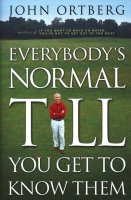
Everybody's Normal Till You Get to Know Them by John Ortberg (Zondervan, 2003)
This book started off with two strikes against it, but survived.
First, it was recommended as a “must read” from someone I care about, and coupled with a feeling of time pressure, which in my oddball psyche immediately sets up a cycle of resistance followed by guilt leading to more resistance, etc. Don’t ask me why, but I’ve been like that as long as I can remember. It was decades before I discovered that most of the books recommended to me, as a child, by my parents were really good stories. I was out of school before conceding that some (not all) of the books I was forced by my teachers to read were actually interesting. And I still haven’t finished Colossians Remixed, which I started in 2005…. Stupid, I know. It's not that I don't ever take other people's reading recommendations; many of my favorite books I learned about from someone else. But for whatever reason, obligation + time pressure = irrational barrier.
Second, I realized immediately that it is written in a style I cannot stand, which I call “modern American evangelical pop culture,” though I suspect it’s much more widespread than that. It’s annoying enough that magazine articles use pull quotes and sidebars, which make sustained reading difficult by distracting from the main text, but I find it inexcusable in book format. Ditto the dumbed-down writing, and the highly informal style, more appropriate for blogs than for books.
Despite these annoyances, I finished the book and am glad I read it. The first hurdle was easy to overcome because I was reading a borrowed book with a fixed return deadline. My breakthrough with the second was a stunning realization that I hope will aid me in appreciating more books written in this (all too common) style. (More)
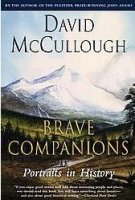
Brave Companions: Portraits in History by David McCullough (Simon & Schuster, 1992)
I need to remember to read more from David McCullough. The man can write.
Brave Companions deserves a long, thoughtful review. I could write a blog post on any and all of these fourteen portraits (thirteen of people, one of a city) and three additional essays. McCullough draws stunning pictures of people—famous and unknown, artists and aviators, writers and scientists—whose actions and personalities made (and are making) history.
But I barely had time to read the book, let alone write about it, and I must now return it to its rightful owner. If you, however, find yourself with sufficient time to enjoy a short book (232 pages) that's easy to read in short bursts (except that you won't want to put it down), you can't go wrong with Brave Companions.
I'd read it for the writing alone; the history, personality, and adventures are a bonus.
 Several months ago, Porter signed us up for a pre-anniversary present of tickets to the Orlando performance of The Screwtape Letters. I tucked them carefully away in my Tickler file, and last week they popped up. I'm very grateful for the Tickler and for Google Calendar—when you book things so far in advance it's all too easy to forget, especially in a season of other big events. It was a delightful post-Christmas outing.
Several months ago, Porter signed us up for a pre-anniversary present of tickets to the Orlando performance of The Screwtape Letters. I tucked them carefully away in my Tickler file, and last week they popped up. I'm very grateful for the Tickler and for Google Calendar—when you book things so far in advance it's all too easy to forget, especially in a season of other big events. It was a delightful post-Christmas outing.
The location, the Plaza Live theater, was initially disappointing, as it looks—and smells—like the converted movie theater it is. But that was easy to forget once the show started.
Not so easy to ignore was the excessive volume of the music and sound effects. I did not want to resort to my earplugs, because the speaking part was of a reasonable volume, but after several assaults I gave up, and was still able to hear the monologue. Yes, it's a monologue, though not a one-man show. But the other character, Screwtape's secretary, Toadpipe, is a mime. And played by a woman, so maybe it is a one-man show after all.
How do you adapt a book, consisting entirely of a series of letters, to the stage? With difficulty, but they did a commendable job. The stage setting is in Hell, where Screwtape is dictating his letters. Toadpipe's acrobatics and the sound effects provide enough action to keep the show moving. For what it is, the show is very well done, and should have large audience appeal. It received a very positive review from the Orlando Sentinel. Even I enjoyed it, no doubt because the script was so faithful to the original. I know the book well enough to recognize that large sections were performed verbatim. Much was, of necessity, left out—I had wondered how they would handle the part where Screwtape turns into a cockroach; they didn't—and there were one or two places where I thought there might have been just a little modernization. But it's hard to beat C.S. Lewis for writing, so I'm glad they didn't try. Best of all, the show stays true to the character of the book.
No show could replace the book itself. But for an introduction to the book, it's a good performance. If only they had turned the volume down!

A Boy's War by David Michell (OMF International, 1988)
In 2010, revelations of unspeakable abuse of missionary children at not one but two West African boarding schools only confirmed my intense belief that missions organizations sinned greatly against the very families that gave everything to serve with them, by expecting—often requiring—parents to send their children away to boarding school at a very young age. After all, isn't one of the (multiple) lessons of the Old Testament story of Abraham's willingness to sacrifice his son Isaac, the counter-cultural message that God does not ask parents to sacrifice their children, but himself provides the sacrifice? How did the organizations dare preach Jesus Christ while demanding sacrifices to Moloch? I'm not talking about high school-aged children who chose to go to boarding school for the sake of a better education and preparation for college, but little ones, as young as six, whose education would have been better accomplished at home with their parents. I daresay the parents' missionary work would have benefitted as well, as the native peoples would have more easily accepted them as fellow human beings as they watched them interacting as families.
Granted, there are many excellent boarding schools. My quarrel is not with families who choose this as the best educational option for their children, but with the missions that mandated the practice. Why did the organizations rip children away from their parents in the name of God, and why did their parents put up with it? It was a long time before I came up with a theory: it may be because so many missions organizations have their roots in England, and other countries where sending small children off to boarding school was standard practice, a historical and cultural given. (More)
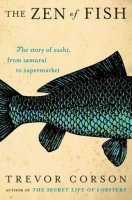
The Zen of Fish: The Story of Sushi, from Samurai to Supermarket by Trevor Corson (HarperCollins, 2007)
Eating sushi is like rearing children: there's always someone happy to point out that you're doing it all wrong.
Not that I care much. So what if many of the rolls I love are American inventions? If the Japanese consider them to be inside-out rolls? If adding more seasoning to your roll is an insult to the chef? (Well, I suppose I care a bit more about the last. I don't like insulting people, especially not those who are providing my dinner. Then again, I'm the one eating it.) I like Japanese sushi; I like American sushi; and I don't mind being too unsophisticated to enjoy the sea urchin and raw quail egg combo that Porter ordered in Boston.
However, I was happy to learn that sushi is meant to be eaten with the fingers, not chopsticks. And eaten in one bite—though I'm not sure how. Do the Japanese have larger mouths than Americans? Seems unlikely.
The Zen of Fish weaves the history, science, and culture of America's unexpected food craze together with the adventures of students at the California Sushi Academy. It's well-written, highly informative, fun to read, and will make you very hungry—when it's not causing you to rethink consuming fish in any form. My only complaint is that the author apparently considered his target audience to be largely made up of adolescent boys. I could have done without most of the sexual references and innuendo—although it was quite cool to learn about the shrimp that start out male, then after a few years become female. The timing of the change assures a gender-balanced population, suggesting perhaps that shrimp are smarter than people.
Okay, even writing about sushi makes me hungry.
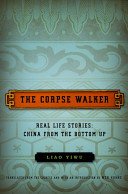
The Corpse Walker: Real Life Stories, China from the Bottom Up by Liao Yiwu, translated by Wen Huang (Pantheon, 2008)
With a title like The Corpse Walker, you might expect this to be a frightening book. And you would be correct. But there's not a zombie in sight.
We are so Euro-centric. We repeatedly hold up Adolf Hitler and Nazi Germany as the epitome of evil. If pressed, we might acknowledge Joseph Stalin, but Russia is more distant, foreign, and unknown than Germany. Compared with Mao Zedong's China, however ... well, you can read more about that in this article on democide.
The Lord of the Flies meets 1984. Liao Yiwu's book is must reading for anyone who still hangs on to the idea that unfettered human nature is basically good, or that the acquisition of power is not one of the most deadly, corrupting circumstances ever. (More)
The Duggar Family is just about the only reason I might wish, a little bit, that we had cable television. Not really; Netflix has spoiled me for watching anything I can't control. But Netflix has also failed me, not offering any but the first two seasons of their show. As a result, I'm 'way behind on their story, other than the little snippets I can see on Hulu. So I can't write the (long) post I want to. Instead, I'll summarize everything I'd hoped to say this way:
- There are many things I like about their lives and the way they are raising their children.
- There are many things I don't like about their lives and the way they are raising their children.
- I don't understand the extreme reactions the family has provoked:
- Not those who treat them like rock stars, standing worshipfully in line for hours just to see them at a book signing.
- Even less those who treat them as if they were evil incarnate, responding with vicious, hateful, ignorant comments.
- No one can ever adequately judge a family while it is still a work "in process." But I will note three things:
- They have been under an intense media spotlight for years; major politicians get less scrutiny. They've been interviewed, filmed, followed, and written about by journalists from all over the world. If they were hiding some dirty little secret, it would be known by now.
- The children (ranging in age from one to 23) are clearly well-behaved, pleasant, active, helpful, and happy.
- The parents are incredibly gracious in their responses to, and understanding of, those who question or misunderstand them.
I say, more power to them, and congratulations on expecting #20! Netflix, are you listening?
Here's a video from the Today Show that considers why the Duggar Family might elicit such strong reactions.
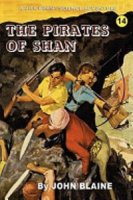
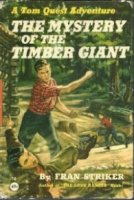
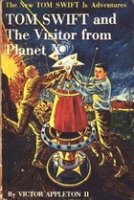
Eight Rick Brant Science-Adventure Stories: The Rocket's Shadow, Sea Gold, The Caves of Fear, The Electronic Mind Reader, The Scarlet Lake Mystery, The Pirates of Shan, The Flaming Mountain, and The Flying Stingaree by John Blaine (Grosset and Dunlap, New York, 1947-1963)
The Mystery of the Timber Giant (A Tom Quest Adventure) by Fran Striker (McLoughlin Bros./Clover Books, New York, 1955)
Tom Swift and The Visitor from Planet X (The New Tom Swift Jr. Adventures) by Victor Appleton II (Grosset and Dunlap, New York, 1961)
The uncovering of a box that had been mostly ignored since our move (yes, that was eight and a half years ago) transported me back to early childhood, on the wings of these books that simply had to be read to help make the agonizing decision: keep? give away? ebay? (Note I said "help." The decision has still not yet been made.)
As a child, I never cared for Nancy Drew or the Hardy Boys; I was hooked on a less popular series: Rick Brant's Science/Electronic Adventures. And do you know? I still am. There are plenty of times when I look back on things I liked/believed/wrote/said/did and am flooded with embarrassment rather than nostalgia. But even though the science in the Rick Brant books is dated—they were written between 1947 and 1968—the value of the stories is undiminished. The science, although somewhat futuristic, was believable then, and so the human elements still are. There is just one aspect that I find embarrassing now, as I did 50 years ago: the female characters, specifically the teenage girls. No wonder I almost always identified with the boys in my childhood books. Looking back, I can see that the girls are more intelligent and less flighty than in many books of that time, but still!
I'd like to be able to finish reading the Rick Brant series, and hope efforts to republish them will be successful. But, unlike the Nancy Drew and Hardy Boys books, these are rarely carried by libraries. Looking back, I'm frustrated with myself for not having bought all the books, or at least made stronger requests for them at Christmas time. It's hard to believe today how unusual it was to buy books back then. We read an awful lot, fetching armloads of books regularly from the library, but buying books was an unusual expense. It was not until after I graduated from college that I broke away from that attitude. (And then with a vengeance; our house has more books than square feet of living space.)
Reading The Mystery of the Timber Giant was the final installment on a very old debt. The book was the thoughtful gift of a friend, and I'm sure I received it with due thanksgiving at the time. But I never read it. I was a picky child when it came to books, and back then was especially suspicious of anything recommended to me by someone else. (I drove my mother crazy; thank you, Heather and Janet, for being more reasonable.) But I kept the book, out of some weird sense of duty. I dragged it, and an accompanying portion of guilt, through five moves, still unread! But now, the debt is paid at last. And guess what? I enjoyed the book.  Perhaps if I had known as a child that Fran Striker had also created The Lone Ranger, I would not have been so hesitant to open the book. I'm not likely to seek out more of the series at this point, but it was an interesting story.
Perhaps if I had known as a child that Fran Striker had also created The Lone Ranger, I would not have been so hesitant to open the book. I'm not likely to seek out more of the series at this point, but it was an interesting story.
The Visitor from Planet X was my first encounter with Tom Swift, Jr., as this book was from Porter's childhood, not mine. Whether or not I would have liked it as a child, I can't say for sure, but I think not. I liked science fiction (and still do), but unlike in the Rick Brant stories, the science here is too unbelievable to be enjoyable. Even fantasy worlds must be credible in their own way, and having your hero avert world-destroying disasters with inventions he thinks up in an hour and builds in a day is further than my credulity will stretch.
Reading all these books within a short span of time, what struck me the strangest was how much all the characters, villain and hero, relied on fist-fights to settle their difficulties. There's not all that much violence otherwise, but that was an era when playground scuffles were not uncommon and boys could exchange black eyes one day and be best friends the next. It's not something you see much in children's literature today.
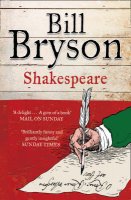
Shakespeare: The World as a Stage (Harper Perennial, London, 2007) by Bill Bryson
Once again, a hit for Bill Bryson. (Thanks, Stephan! You'll get the book back in January.) This time he tackles, with his usual wit and excellent writing, what we know (and, importantly, what we do not know) about the greatest English playwright.
Actually, it is arguable that Shakespeare was not, in truth, the greatest English playwright, but to their undeniable status as great works, his plays added the stellar quality of survival, most playwrights of that era not having had the benefit of compilers Henry Condell and John Heminges, who with unusual foresight put together a collection of most of Shakespeare's plays after his death. We don't know what we are missing.
Full many a gem of purest ray serene
The dark unfathom'd caves of ocean bear:
Full many a flower is born to blush unseen,
And waste its sweetness on the desert air.
(not Shakespeare)
On the other hand, we have certainly been spared a mountain of dreck.
To prosper, a theatre in London needed to draw as many as two thousand spectators a day—about 1 per cent of the city's population—two hundred or so times a year, and to do so repeatedly against stiff competition. To keep customers coming back, it was necessary to change the plays constantly. Most companies performed at least five different plays in a week, sometimes six, and useed such spare time as they could muster to learn and rehearse new ones. ... What is truly remarkable is how much quality the age produced in the circumstances. ... For authors and actors alike, the theatrical world was an insanely busy place, and for someone like William Shakespeare, who was playwright, actor, part owner and probably de facto director as well ... it must have been nearly hysterical at times. Companies might have as many as thirty plays in their active repertoire, so a leading actor could be required to memorize perhaps fifteen thousand lines in a season ... as well as remember every dance and sword thrust and costume change. Even the most successful companies were unlikely to employ more than a dozen or so actors, which meant a great deal of doubling up.
And you thought your life was crazy? Most of us, whatever our field of endeavor, like to think that we, too, could produce high quality work if only we had the time. But true geniuses, like William Shakespeare and Johann Sebastian Bach (whose job required him to write a new cantata every week, in addition to his other considerable responsibilities), create their great works in spite of, if not because of, tremendous pressure to produce. (More)
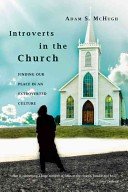 Introverts in the Church: Finding Our Place in an Extroverted Culture, by Adam S. McHugh (IVP Books, 2009)
Introverts in the Church: Finding Our Place in an Extroverted Culture, by Adam S. McHugh (IVP Books, 2009)
(I wrote briefly about this book based on a Mars Hill Audio interview with its author; now I have finally read it myself and can do it more justice.)
Hello. My name is Linda, and I'm an introvert.
(Hi, Linda!)
That's the way I once thought about this aspect of my personality type, as many people still do. At best it's an affliction, a disease—if not evidence of weak character or even mental illness.
Rare is the book that will make me cry, unless it's in frustration over poor writing, but Introverts in the Church brought me to tears in the early chapters, as I recognized again and again how many of the characteristics of my own life fit into the introverted pattern. "I am not alone" is a most powerful emotion. I was also reminded of Marcus Buckingham's assertion that we spend too much time and effort trying to shore up our areas of weakness, and not enough building on our strengths. Somehow we have been sold on the idea that introverts should work hard at being more like extroverts, rather than applying our strengths for the common good. What's more, I discovered that in trying to act more like an extrovert (and doing it rather badly), I have myself misunderstood and hurt fellow introverts.
McHugh's focus is on how this dynamic plays out in the church, so the remainder of the book was not as emotionally moving as the beginning, but it, too, was revealing, as I gained insights into why introverts are often uncomfortable in modern churches, and why their unique gifts are just as important as those of extroverts—and may be especially valuable because we live in such an unbalanced time.
My comment that I should probably buy a copy of Introverts in the Church just so I could lend it out provoked the response, "Would you lend it to your introvert friends or your extrovert friends?" The obvious response is, "To both." To the introverts, so that they might experience the affirmation that their weaknesses are the flip side of strengths of which our world is in much need, and to the extroverts—exactly the same thing, actually, and so that they might understand, appreciate, and encourage the introverts in their lives.
As usual, there's no way a few quotes can do justice to the book, or give an adequate picture of what the author presents. What's more, long quotations are discouraging to most blog readers, myself included, I am somewhat embarrassed to say. Nonetheless, here is a small sampling of ideas that struck me, culled from the bookmarks that bristle all over the book's 200-some pages. (More)
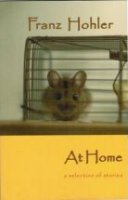 At Home, by Franz Hohler (translated from the German) (Bergli Books, Basel, Switzerland, 2009)
At Home, by Franz Hohler (translated from the German) (Bergli Books, Basel, Switzerland, 2009)
Franz Hohler observes the same situations you or I might, but sees them quite differently. He sees stories.
At Home was a Christmas gift to Porter (thanks A&M!), and he found it the perfect book to read for his hectic life: the stories are for the most part very short, and thus the book can be read in bits and snatches, here and there. Not that you'll want to put it down if you can help it.
Some of the stories are a bit on the weird side (though not nearly as weird as Ray Bradbury's), but most show a very interesting perspective on life, and nearly all are enjoyable. The tale of the man who inadvertently brings a baby devil home from the pet store is fascinating, perceptive, and frightening (though not at all in the modern gross-out horror film sense). I, of course, enjoyed reading about and recognizing aspects of Swiss life; Hohler is Swiss and lives in Zurich.
Because it's very short, and because of its steel connection, I'll quote in entirety the final story in the book, hoping Herr Holner would consider it "fair use" and good advertising. It's called The Mailbox, and provides a good snapshot of his style.
"I wish I were a racing bike," said the mailbox to the garden gate, "and could flit through wide plains and conquer mountain passes."
"You and your wishes," croaked the garden gate, "when you don't even meet the official postal regulations."
"One can always wish," sighed the mailbox, and continued to swallow bills, magazines, advertisements and postcards.
A little later he was unscrewed and replaced with a new one. He was melted down. Then together with old metal chairs, torn wire fences and bent screwdrivers, he was processed into light steel, landed in a racing bike factory, and was soon flitting across wide plains and conquering mountain passes and could hardly believe that he had stood for years in the same place and every day nearly choked on the mail.


